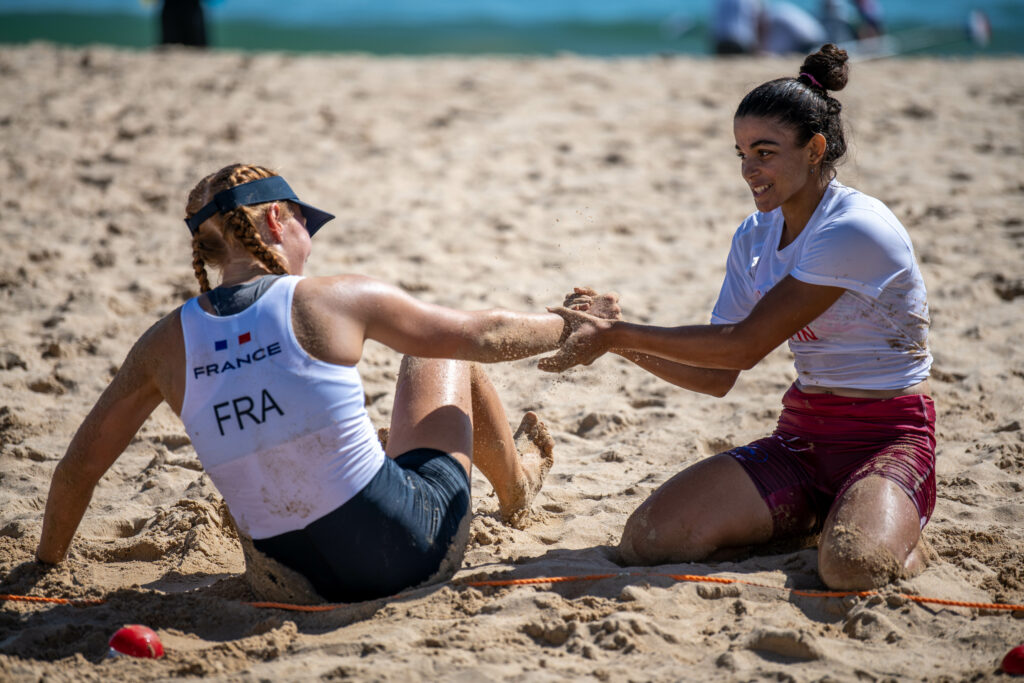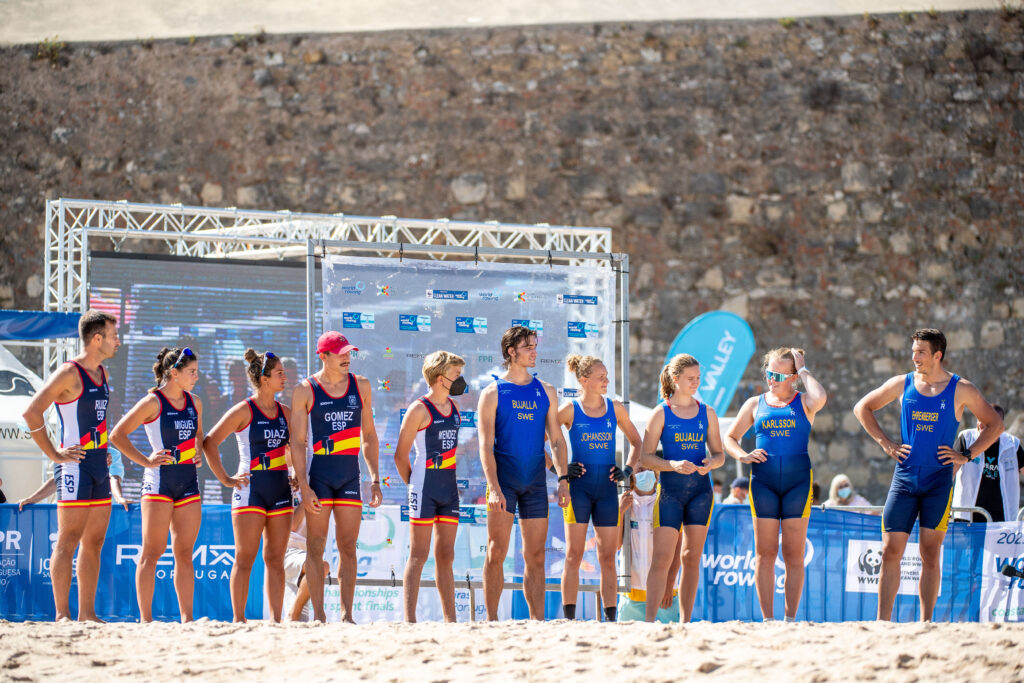
25 Sep 2021
First 2021 World Rowing Beach Sprint Champions Crowned on Praia da Torre
The first day of finals proved how exciting beach sprints can be with capsizes, sprint finishes and fiercely close racing. Medals were handed out in four boat classes with more to come tomorrow.
Junior Men’s Solo (CJM1x)
A capsize from Yosuke Yasui of Japan in the quarterfinals led to him being knocked out, despite a successful recovery and completing the race. Although Germany’s Manuel Muetzel had a fast sprint across the beach to his boat, Bilel Frigui of Tunisia made up for it on the water and beat him to post the fastest time in the quarterfinals, 2:54.04.
Having been the fastest athlete in the time trial, Portugal’s Afonso Santos had progressed directly to the semifinals whereas Miguel Salas Cordoba from Spain had to race twice within 30 minutes and the lactate acid had perhaps built up. Santos took the win to book his place in the gold medal race.
In the B final, the two scullers raced at very different rates but reached their turning buoys simultaneously. Miguel Salas Cordoba had the better first half of the sprint towards the beach but, in the second half, Bilel Frigui made up ground and drew level. The scullers jumped out of their boats at the same time and it came down to the final sprint to the line where Frigui took bronze for Tunisia.
There had been eight seconds between the two A finalists in the time trial so Mathias Soldati of France had a point to prove to try and overcome Santos. Soldati’s sprint to the boat was significantly faster but as he pushed off, a huge wave filled his boat and caused him to come to a standstill allowing Santos to scull away. Soldati made an impressive effort to try and close the gap, but Santos took the first gold of the 2021 World Rowing Beach Sprint Finals in a time of 3:04.87.
Gold: POR – Silver: FRA – Bronze: TUN
Junior Women’s Solo (CJW1x)
Following some technical difficulties with the USA boat, the first quarterfinal got underway a few minutes late. A low tide meant a long run down the beach to the boats. Britt Wotovich was by far the fastest on the water, reaching the turning buoy several lengths ahead and getting smoothly round for the sprint back to the beach. Germany’s Anouk Eichelbeger capsized as she beached her boat, leaving it upside down as she ran to the line.
Excellent navigation by Hela Belhaje Mohamed of Tunisia secured her a comfortable victory in the second quarterfinal including a ride on a wave towards the beach. In the third and final quarterfinal, Madalena Peca was the first around the turning buoy, establishing a lead of a length and a half on the final sprint to the beach. Peca managed to dive across the line before Spain’s Esther Llinares Buades was even out of the boat.
Just 21 minutes after she had raced her quarterfinal, Britt Wotovich came up against France’s Zuzanna Sarek who had progressed straight to the semifinals. The race was aborted due to a timing issue but got underway cleanly at the second attempt. Sarek had a significant lead in the final sprint to the beach and secured her place in the gold medal final. It was a rapid start from Belhaje Mohamed in the second semifinal and with a perfect buoy turn, she maintained the lead as they returned towards the beach.
The current seemed to wreak havoc with navigation in the B Final with Witovich going the wrong side of the first buoy. Peca took advantage and was several lengths clear, despite some steering challenges of her own. A clear sprint to the beach extended the lead for Peca to take the bronze medal.
Tunisia’s Belhaje Mohamed took the lead from the very first strokes of the A final, and was first around the buoy turn, but she faced serious opposition from Sarek. With Belhaje Mohamed benefiting from a wave to help her into the beach, she became the first ever champion in this boat class with Sarek following eleven seconds behind.
Gold: TUN – Silver: FRA – Bronze: POR

Mixed Coxed Quadruple Sculls (CMix4x+)
The two coxes from Spain and Japan got the quarterfinals of the mixed quadruple sculls underway as they sprinted towards the boats and it was Spain that got their boat on the water the quickest. The coxes helped them to steer a dead straight line back towards the beach. It looked like Ireland had things sewn up in the second quarterfinal but as the boats landed on the beach simultaneously, Ireland had a painful exit from the boat, and Sweden won the sprint to the buzzer. The lead was exchanged several times in the third quarterfinal but the USA eventually crossed the line first to progress to the semifinals. France was already a length up heading towards the first buoy in the fourth quarterfinal and they continued to extend their led throughout the race, taking advantage of a disaster in the Portugal boat as they suffered with a broken oar.
Like the rest of their boats, the Spanish crew had a strong start in the first semifinal and established an early lead which was 2 lengths by the buoy turn. They held on to the lead as their bowman sprinted up the beach to hit the buzzer first. The second semifinal was a much closer affair until just after the buoy turn when France sprinted for home to land on the beach first.
The B Final was perhaps the race of the day so far. Sweden and the USA went around the buoy turn simultaneously and it all came down to the sprint back to the beach. Sweden was the first boat onto the beach and it came down to the run to the line where John Huppi was the fastest, earning the USA the bronze medal.
In the A final, both athletes were rapid out of the blocks with the run to the boats. Spain continued to be the boat to watch and had around a length lead by the hairpin turn at the far end of the course. The power of the French boat was really showing in the final sprint as they tried to close the gap, but Spain was first to the beach. Spanish athlete Ramon Gomez Cotilla began his celebrations early as he sprinted towards the line to take gold.
Gold: ESP – Silver: FRA – Bronze: USA

Mixed Doubles (CMix2x)
Spain motored out of the start of the first quarterfinal and even with a very impressive buoy turn, Portugal was unable to catch them. Some slightly loose steering by Canada allowed Greece to take advantage and win the second quarterfinal and it came down to the beach run where Greece hit the buzzer first by just 0.244 seconds ahead. With boat speeds at 45 strokes per minute, France and the USA went around their turning buoys together and after their sprint to the line, there was less than a second between the two crews, France getting to the buzzer first. Married couple and Olympians Maciej Zawojski and Agnieszka Kobus-Zawojska from Poland had strong boat speed, but it was Tunisia that made the buoy turn first and continued to move away to cross the line first and progress to the semifinals.
Spain continued to dominate the competition reaching the turning buoy ahead in the first semifinal, but Greece started to pull up level on the return to the beach. Spain landed on the beach for and won the sprint to the buzzer. France went out in front and established a clear water lead by the buoy turn in the second semifinal, with Tunisia just unable to match their speed.
In the B Final, racing for the bronze medal, it was all to play for as Greece and Tunisia went around the turning buoy simultaneously. Greece had the faster scull back to the beach, establishing over a length lead, and landing first. Zoi Fitsiou of Greece hit the buzzer three seconds ahead of Tunisia’s Sarra Zammali to win the bronze.
In the last race of the day, France and Spain came up against each other yet again. With Spain at 47 strokes per minute, France was matching their boat speed and it looked like it was going to come down to another sprint and leap for the buzzer. However, there was a bit of an upset with navigation from France as they headed back towards the beach allowing Spain to sprint the finish and take their second gold medal of the day.
Gold: ESP – Silver: FRA – Bronze: GRE

